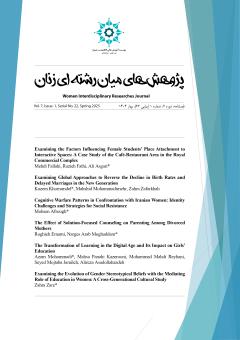-
-
-
Open Access Article
1 - Identifying and Measuring Factors affecting Entrepreneurial Intention in Engineering Students of Al-Zahra University
esmaeel kalantari mahbubeh nourizadeh Abolghasem arabiun -
Open Access Article
2 - Identifying and Measuring Factors affecting Entrepreneurial Intention in Engineering Students of Al-Zahra University
mahbubeh nourizadeh -
Open Access Article
3 - Explaining the family pattern in fertility with an analytical approach and referring to Quranic teachings
فاطمه فرهادیان Narges Afshar -
Open Access Article
4 - The effectiveness of life skills training on attitudes toward addiction in adolescent girls
Zahra Nemati behrang esmaeilishad -
Open Access Article
5 - Investigating the Relationship of Parenting Styles with Parents’ Sexual Knowledge and Attitude and the Level of Interest in Talking about Sexual Issues in Shirazi Families
Soheila Bastani Mitra Safakish
List of Articles attitude
-
The rights to this website are owned by the Raimag Press Management System.
Copyright © 2017-2025


